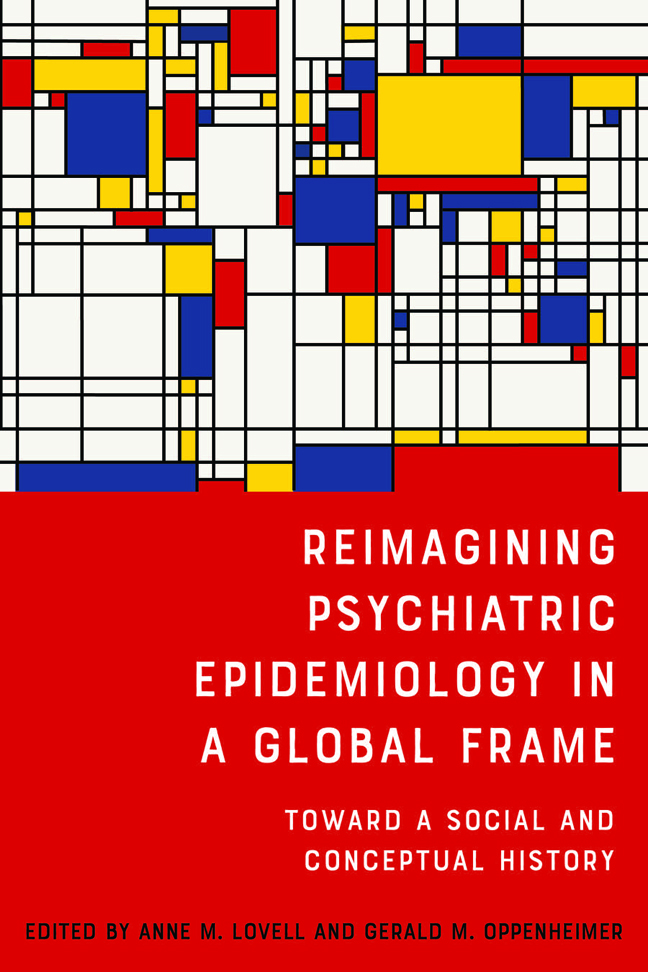Book contents
- Frontmatter
- Contents
- Acknowledgments
- Introduction
- Part One Constructing Mental Health Utopias and Dystopias with Epidemiology
- Part Two Troubling the Boundaries of Psychiatric Epidemiology
- Part Three Decentering Psychiatric Epidemiology in a Postcolonial World
- Selected Bibliography
- Notes on Contributors
- Index
Two - Self-Participatory Surveillance: The Hisayama Study on Dementia in Japan
Published online by Cambridge University Press: 15 February 2024
- Frontmatter
- Contents
- Acknowledgments
- Introduction
- Part One Constructing Mental Health Utopias and Dystopias with Epidemiology
- Part Two Troubling the Boundaries of Psychiatric Epidemiology
- Part Three Decentering Psychiatric Epidemiology in a Postcolonial World
- Selected Bibliography
- Notes on Contributors
- Index
Summary
Self-Fashioning of an Epidemiological Subject
The recent global rise of preventive psychiatry has brought psychiatric epidemiology into a more public arena, generating new sets of community surveys about developmental disorders, depression, and dementia. This is certainly the case in Japan, where one psychiatric epidemiologist has diagnosed the field as having long remained in a “prenatal stage.” Despite its early footing in Japan at the turn of the twentieth century, psychiatric epidemiology faced an inhospitable environment there. Particularly in the latter half of the twentieth century, stigma against psychiatry was so strong that community mental health surveys would cause alarm about their underlying political implications and possible invasion of privacy. Aside from a few WHO collaborations, psychiatric epidemiology was further hindered by the long-lasting antipsychiatry movement from the late 1960s to the 1980s, which critiqued it as an insidious surveillance tool that appropriates ownership of self-knowledge and promotes/naturalizes certain ideologies through a particular vision of psychiatric health. Thus, mental health community surveys only began to reflourish in the 1990s, with a community survey on depression in 1994 that may have helped pave the way toward near-mandatory “stress checks” (mental health screening) among workers nationwide, beginning in 2015. With the installment of the Act to Support Persons with Developmental Disabilities in 2004, surveys about developmental disorders followed. Dementia has received much attention recently, as mandatory dementia screening is required for anyone over seventy-five wishing to renew a driver’s license. With the increasing “neuropsychiatrization of the lifecycle,” psychiatric epidemiology is gradually gaining acceptance in this country and being incorporated into pre-existing health screening systems in the school, the workplace, and the community nationwide.
Despite the changing attitude, public ambivalence continues to be expressed at more thorough attempts at collective surveillance of mental health, as seen in the debates regarding epidemiologically based, preventionoriented community experiments such as the “Smart Wellness City,” an urban planning innovation for managing the health of residents who volunteer to monitor their daily health information via an automated, electronic system. Even as some doctors and policymakers rejoice in the technological advancement that such a thorough screening system provides and the autonomy it can create for individuals, other social commentators have expressed concern about potential invasion of privacy and unease about surveillance that seeks to reveal our (hidden) neuropsychological health.
- Type
- Chapter
- Information
- Reimagining Psychiatric Epidemiology in a Global FrameToward a Social and Conceptual History, pp. 78 - 103Publisher: Boydell & BrewerPrint publication year: 2022



